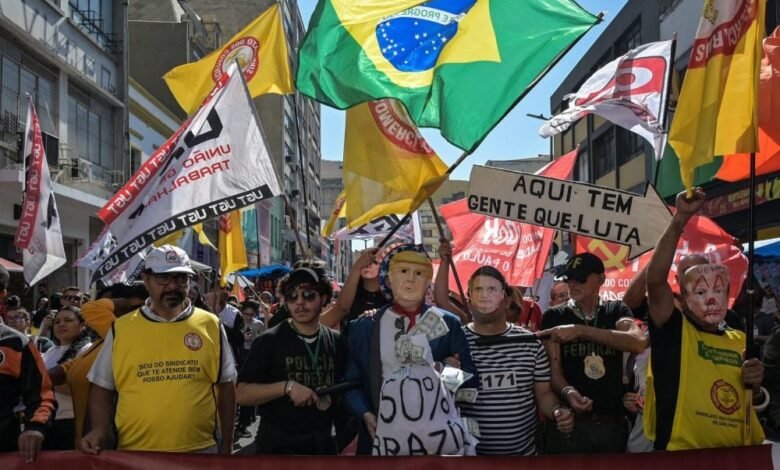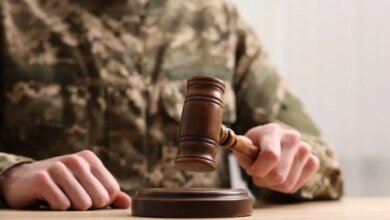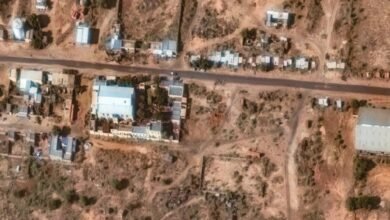Is Trump Attempting Regime Change in Venezuela?

Is the White House attempting regime change in Venezuela? This week, the U.S. Navy’s largest warship, the USS Gerald R. Ford, took up a new position in the Caribbean after leaving the Middle East last month. The latest maneuvering comes after weeks of U.S. strikes on boats in the region that the Trump administration alleges were involved in narcoterrorism—although those claims have not been backed up by evidence.
In his first term in office, U.S. President Donald Trump tried and failed to remove Venezuelan President Nicolás Maduro from power. Trump seems more determined this time. To understand how the White House might be thinking about Venezuela’s future, and how that fits into its broader policy in Latin America, I spoke with Oliver Stuenkel on the latest episode of FP Live. Stuenkel is a senior fellow at the Carnegie Endowment for International Peace and an associate professor at Fundação Getulio Vargas in São Paulo.
Subscribers can watch the full discussion on the video box atop this page or download the FP Live podcast. What follows here is a lightly edited transcript.
Ravi Agrawal: Let’s start with Venezuela. This is quite a military buildup on Washington’s part. What do you think the White House’s goal is?
Oliver Stuenkel: Everybody is speculating, of course. For now, everything suggests that the Trump administration is seeking to scare Maduro into resigning. There’s still a lot of concern in Washington about potential unintended consequences of having boots on the ground. A significant part of the Trump electorate is very wary about military entanglement with uncertain exit strategies.
There are two factions in the White House. The MAGA faction, led by people like Richard Grenell, is very reluctant to use force to remove Maduro from power. They have actually sought to negotiate directly with the Venezuelan president. He could cut a deal to guarantee that the United States has access to Venezuelan oil.
But at the same time, there’s a faction led by Marco Rubio, who is also thinking about his long-term political career. He may have presidential ambitions, and being the secretary of state on whose watch regime change actually happened would be electorally beneficial.
It’s important to keep in mind that Trump tried and failed to remove Maduro from power indirectly during the first term. Now I see this as a second iteration, with a much stronger military presence. But there are few signs that the United States is going to actually engage militarily. Perhaps the primary goal is to create a situation in which there will be an internal uprising—perhaps a general, perhaps the population—seeking to rise up against Maduro’s dictatorship.
RA: Meanwhile, Venezuela is also mobilizing its military. It has S-300s, for example, which are fairly sophisticated long-range missile systems. But there’s a long history of interventions in the region—including attempting regime change—rarely going to plan.
OS: Many supporters of regime change in Venezuela perhaps think about Panama in 1989, when the United States mobilized around 27,000 troops to remove Gen. Manuel Noriega from power. That was a fairly simple operation, and Panama has been a stable democracy since.
Yet, of course, these are profoundly different countries. The Venezuelan regime has been in power for decades. It’s essentially a military-led government with tremendous power, and the opposition is very much sidelined. Opposition leaders know that without U.S. pressure, they will not be able to topple Maduro, whose power is very much consolidated. There’s very little incentive for the armed forces to move against him, in part because it’s very unclear what transitional justice would look like. If you’re part of the Venezuelan military leadership, it’s important to think about what your incentives are to give in to U.S. pressure.
The Venezuelan assessment is also that Trump is not somebody who wants to tackle a particular issue for a long time. He may just move on after a couple of weeks or months, as he ultimately did in 2019, when there were large-scale protests against the government and Juan Guaidó was getting recognized as the legitimate leader by many countries in the West. In the end, the West abandoned Guaidó, and Maduro remained in power.
There is not enough thought given to post-Maduro scenarios. A lot could happen. You could have the military substituting Maduro with someone who keeps the regime in place. That still may be sufficient for Trump to move on and say, “We removed Maduro.” There’s very little interest in making sure that Venezuelan democracy would flourish after an operation like that. Alternatively, you could have the scenario of the opposition leader María Corina Machado coming to power and Venezuela actually democratizing. Or you could also have internal conflict. The Maduro government is not in control of the entire territory of Venezuela. Organized crime groups control parts of the south. And then, of course, you could also have the United States engaging in a more long-term fashion, which Trump doesn’t want to do.
Right now, the bet is that this kind of outside pressure—mostly symbolic—weakens Maduro sufficiently, in part because direct military intervention would inevitably delegitimize the incoming government because it would be seen as dependent on the United States.
But it’s also important to keep in mind that even if “successful,” a U.S. intervention in Venezuela could have massive consequences for U.S.-Latin America relations more broadly, because Trump could easily apply this same justification to other countries. Certainly, you’d have a rally-around-the-flag effect in countries and an attempt to diversify ties, further seeking closer ties with countries like China.
RA: There’s one other element just to the Venezuela thing. How would regime change in Venezuela affect Cuba, which has long been propped up by and received cheap oil from Caracas and of course has a fraught history with the United States?
OS: Similar concerns to those I raised about Venezuela apply to Cuba, where any kind of more assertive U.S. policy can produce a rally-around-the-flag effect. Venezuela’s capacity to actively support Cuba is no longer as significant as it was in the past. But I would say that it’s far from assured that a change of government in Venezuela would decisively weaken the Cuban government, which retains diplomatic and economic ties with many other countries around the world.
Interestingly enough, Cuba is less isolated diplomatically than Venezuela is at this moment. Just last week, there was a summit of leaders from Latin America and the European Union. At the last minute, Venezuela decided not to sign the final declaration because it makes a fairly centrist argument criticizing the Russian invasion of Ukraine. This really baffled many leaders in Latin America, who see this as a moment where Venezuela should seek stronger diplomatic ties to other Latin American countries. But Venezuela wasn’t willing to risk the declaration negatively affecting its ties to Russia.
RA: One other big difference between now and 10 or 20 years ago is that Venezuela produces less oil than it did. That’s partly its own fault for messing up supply chains—but also the price of oil is lower than it used to be. That changes some of the dynamics in terms of how valuable Venezuela is to its neighbors.
It is striking to me that not many leaders are sticking their necks out to criticize what is seen as a violation of international law in Venezuela. Colombian President Gustavo Petro has been more outspoken than most. How are countries thinking about a response?
OS: Petro is really a separate category. He’s opting for a more confrontational strategy, which is seen as very controversial in both Colombia and the region, because he’s not running for reelection in May.
Claudia Sheinbaum in Mexico, Luiz Inácio Lula da Silva in Brazil, and Gabriel Boric in Chile are all adopting a fairly pragmatic stance. There’s a broad consensus across the region that the best strategy is multialignment—to preserve ties with the United States, China, but also with Europe, Russia, and other actors around the world, such as in the Middle East. It’s a kind of active neutrality. Nobody wants to downgrade ties to China, but also very few leaders are willing to see commercial ties to the United States downgraded permanently. There is an occasional criticism here and there, but mostly it’s pragmatic, resisting in a firm and measured way. Of course, there’s some political cost to being seen as excessively submissive.
But there’s a difference between countries like Colombia and farther north, which are much more economically dependent on the United States, and those south of Colombia, which are in a completely different world. Brazil has been quite careful not to give in to some of the demands made by the United States, for example. But Brazil exports more to China than it does to the EU and the United States combined, which gives Lula more wiggle room. The policy of partisan interventionism being pursued by the United States—pressuring countries that are seen as not ideologically aligned, such as Brazil, and seeking to offer carrots for ideological allies—does have some impact, but the United States no longer has the same influence in South America that it had two or three decades ago.
Maduro is so unpopular now that only people on the far left defend him. So the strategy in Brazil, for example, will be to seek to mediate. It wants to make sure that criticism of Trump’s interventionism doesn’t negatively affect negotiations on issues such as tariffs, which Brazil wants to see reversed as soon as possible. But what really determines U.S. strategy vis-à-vis Venezuela are domestic politics, and that’s not something any Latin American country can control.
RA: What is the broader America First strategy in Latin America? Keeping in mind the recent references to the Monroe Doctrine and the idea of great powers controlling different hemispheres, which would make Washington the imperial HQ for the Americas. Is that what animates the Trump administration’s vision for a Latin America policy?
OS: The Monroe Doctrine emerged in the 1820s, when there was a lot of ideological alignment between the newly independent Latin American states and concern about European interventionism. The U.S. government said the Americas should be controlled by the Americas. That, of course, changed at some point. It wasn’t only about keeping the Europeans out but also justifying U.S. interventionism.
The way Latin America has experienced the Monroe Doctrine has changed over time, but the dominant legacy is of the United States not necessarily as a protector but as a country that frequently intervenes and violates the sovereignty of nations in a region it considers its backyard.
Both Trump administrations have actively supported this idea, saying that “we should be less engaged around the world, we should protect our borders, and we should be more engaged in the Americas with migration, drug trafficking, and so on.” It is, to some extent, a revival of the Monroe Doctrine, which would have been unthinkable even by Republican administrations only 20 years ago.
RA: The other element here is geography. One of the other organizing principles for Trump’s foreign policy seems to be oil and critical minerals.
OS: Oh, absolutely. You have the lithium triangle in Chile, Argentina, and Bolivia. You have about 20 percent of the world’s rare earths in Brazil. Recently, the U.S. International Development Finance Corp. made an announcement that it would invest half a billion dollars into a mine in Brazil. The rare earths being extracted there are still being sent to China, paradoxically, because the United States doesn’t have the processing capacity, but it’s racing to get there. It is an attempt to diversify rare-earth supply chains away from China. Clearly, it’s also about that.
There’s also the reality that for the majority of countries in South America, we’re now in a multipolar world. China has become increasingly important, and the kind of strategy pursued by Trump, where ideological alignment is the anchor of the bilateral relationship, produces a very volatile scenario.
We see a lot of polarized rhetoric when it comes to foreign policy. So some candidates, particularly on the right in Latin America, even welcome, rhetorically speaking, potential U.S. intervention in Venezuela. They want to move closer to the United States, and left-wing leaders tend to be more critical of the United States. The consensus is that it is no longer viable for South America, and even Latin America as a whole, to reverse that process of multipolarization that has deeply impacted their economies.
RA: That makes a lot of sense. Is there some sort of framework for how leaders think about where they sit vis-à-vis the United States? It doesn’t quite seem that it’s left-right. It doesn’t quite seem that the divide is democracies and autocracies. I often wonder if it something a bit more personal? And this makes me want to ask you about Brazil, which you know so well. Trump was quite close to Jair Bolsonaro, the previous president, and Lula, the current leader, is necessarily in a very different position with Trump because he is not Bolsonaro. It’s not just about his politics.
OS: There’s been a number of uncanny similarities between Brazilian and U.S. politics over the past decades, including the rise of anti-establishment, right-wing populism. Bolsonaro, who came to power two years after Trump, projected himself as the “Trump of the Tropics.” A lot of the issues that are coming up in the United States for the first time—we’ve dealt with for centuries in a way. It’s quite interesting to see those parallels.
But clearly Bolsonaro wanted to be a key ally of Trump and was ideologically aligned. After Trump lost the 2020 election, there was a lot of concern that we could have a similar situation in Brazil. That’s exactly what happened. Brazil had its Jan. 6, two years and two days later—Jan. 8, 2023—when Bolsonaro supporters stormed Congress, the presidency, and the Supreme Court. The judiciary’s response in Brazil was largely based on the perception that the United States had not handled its own situation particularly well. Bolsonaro lost his political rights and is set to go to jail very soon.
Trump sees himself when he looks at Bolsonaro, which explains why the initial justification for unprecedented tariffs on Brazil was the supposed witch hunt against Bolsonaro. That ended up helping Lula politically because he had no political space whatsoever to negotiate. The president of Brazil doesn’t control the Brazilian judiciary. He was free to push back because he could project himself as a protector of Brazilian sovereignty.
RA: Part of the reason I’m interested in the personal here is because what makes the Trump administration so unique in American history is how much decision-making is conducted by one man, rather than by a system of experts and people who feed him information. In Latin America, Trump seems to have struck up personal relationships with leaders like Javier Milei in Argentina or Nayib Bukele in El Salvador.
MAGA adores Milei, a libertarian, chainsaw-wielding poster boy for small government. It’s hard to see the $40 billion bailout Trump gave him just through the prism of U.S.-Argentina relations, as opposed to the visions of two individual leaders.
OS: No, absolutely. The case of Milei is really quite remarkable. Milei has projected himself as a friend of Trump and has received significant benefits. Just a month ago, his allies lost elections in the province of Buenos Aires, suggesting that Argentines were beginning to lose patience with many of the libertarian policies adopted by their government. A lot of people expected this trend to continue during the midterms, but in the days prior to the election, Trump very actively sought to support Milei and offered Argentina a huge bailout, which is really crucial to provide some temporary stability so that Milei can continue his policies. He basically threatened the Argentine voters: If you don’t vote for this guy, we will not support Argentina’s economy.
We’ve seen several justifications from the United States as to why it did that. Treasury Secretary Scott Bessent, for example, said this is an economic Monroe Doctrine, to make sure that our friends or allies are in power. This may also help similar candidates in upcoming elections in Chile this weekend and next year in Colombia, Peru, Costa Rica, and Brazil. That is, again, without precedent and paired with very aggressive tariff threats.
In El Salvador, Bukele has flattered Trump a lot and can also provide significant support with the migration agenda, as he’s willing to bring in people who have been expelled from the United States. But it’s really quite remarkable to support someone who has been undermining El Salvador’s democracy systematically. The United States’ entire democracy agenda has largely disappeared in Latin America.
RA: Broadly across Latin America, how do people perceive the United States under the Trump administration in its second term?
OS: The region is incredibly polarized, so it depends who you ask. Particularly in countries like Argentina—but also increasingly Chile or Brazil—you do have a polarization at least in the public discourse that impacts the way people see the United States and think about their foreign policy. In practice, though, it doesn’t really translate into actual foreign-policy decisions. For example, Brazil’s agribusiness supports right-wing candidates. But they’re hugely dependent on China. So they’re comfortable voting for someone who says, “I’m Brazil’s Trump. I will cut ties to China. Let’s make Brazil great again, just like Trump made America great again.” But then in practice, they’re really unwilling to cut ties with China because there is an incredible economic complementarity between South America and China, which doesn’t exist with the United States. Trump is unwilling to sign a big trade deal with Brazil, and Brazilian soy farmers compete with American soy farmers.
It is clear that interventionist rhetoric and actions like Trump imposing sanctions on the president of Brazil’s Supreme Court, for example, do produce a backlash and allow other key geopolitical actors to present themselves as more comfortable and reliable partners. The major beneficiary of all this is China. It doesn’t have to do anything. Countries across Latin America look at the United States and see an unpredictable actor. What happens if in the next election you could have a center-left government come to power in Argentina? What happens then? Nobody knows. The relationship to China is much more predictable.
But still, opinion polls suggest that conservative voters in many Latin American countries are more willing to support their governments moving closer to the United States and Trump and would react less badly to U.S. intervention in Venezuela than voters on the left. There was a bizarre incident where the mayor of Lima, Peru, who has presidential ambitions, organized a memorial for Charlie Kirk and bused in people from poor parts of the city because he wanted to be seen by the MAGA movement. Reporters at the scene said most people had no idea who Charlie Kirk was. This is the kind of thing you will certainly see when leaders seek to establish a personal relationship with Trump. They seek to frame issues they face in a way that Trump can understand. They will embrace cultural wars, even though they’re not personally invested, as a way to establish a relationship with the MAGA movement. These are the kinds of things we will see more frequently in the region.
Don’t miss more hot News like this! Click here to discover the latest in Politics news!
2025-11-13 18:52:00




